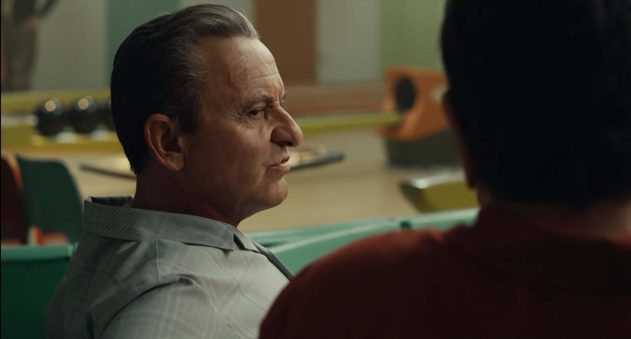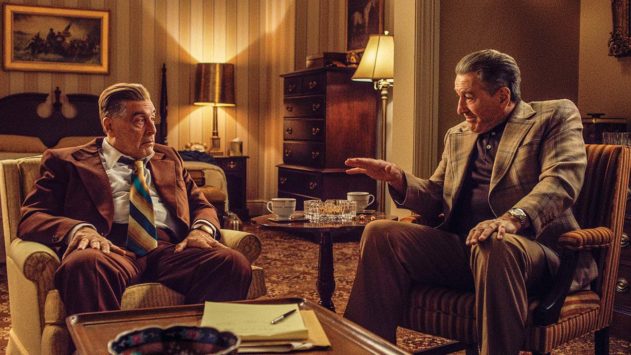Scorsese’s ‘The Irishman’ is a sprawling masterpiece, Joe Pesci gives memorable performance
Scorsese has directed many a cinematic winner. But, with the exception of 2016’s “Silence” (which I found to be brilliant on so many levels) it had been a while since the accolades of brilliance could be applied to this filmmaker.
Make no mistake, it is rare when he fumbles, and most of his films have found their way unto my Ten Best lists of their respective years. But over the last decade, the mojo of his glory years (from 1967’s “Who’s That Knocking at My Door?” to “Casino” in 1995) had been out of reach. Great films, to be sure, but it was the Marty magic that I sought.
And now, here comes “The Irishman” and I am more than ecstatic to be able to call it a late-career masterpiece.
Originally tapped to be financed by Paramount Pictures, this decades-spanning crime drama was deemed too costly (the budget is in excess of $150 million). Ever-growing film production giant Netflix welcomed Scorsese with open arms and deep pockets. A gamble but with a limited three-week run in cinemas and what looks to be a popular campaign on Netflix (beginning November 27), this looks to be a gambit that will pay off for Netflix.
With “The Irishman,” Scorsese closes the book on a genre he pretty much owns. He gave us the low-rent street hustler wannabe mob guys from “Mean Streets” that led to the dark reality behind the glitzy demimonde of “Goodfellas” and the visceral excitement of “Casino.” Crime has always been Scorsese’s most inspiring canvas and for decades no one could paint a mob tableau like him.
See ALSO: our recent interview with Scott Z. Burns and Jake Bernstein of ‘The Laundromat’
With “The Irishman” he says goodbye to that world with a deeply-reflective and character-driven Viking’s funeral that holds the best that American cinema can offer.
Starring in his finest role and giving his best performance in over twenty years, Robert De Niro is Frank Sheeran, an Irishman who begins working for the Italian mob. Joe Pesci (who is bound for a second Oscar here) is Russell Bufalino, the quiet and straightforward boss who brings Sheeran into this world and befriends him and his family.
We first meet Sheeran at the end of his life, sitting in a wheelchair at the age of 83 as he recounts his life story to the audience. That narrative begins when he was in his early thirties working as a union truck driver and through his mobbed-up lawyer (a very good Ray Romano) Sheeran meets Bufalino who takes him in as a son/dear friend, giving him tasks where he takes care of business matters such as deadbeat collections and eventually, murder.
It is through Bufalino that Sheeran meets boss Angelo Bruno (Harvey Keitel drawing excellence out of a cameo appearance) and eventually to the “guy at the top,” Hoffa himself (Al Pacino reminding us how brilliant he is).
Much like the mobsters in “Goodfellas” and “Casino,” just when life is looking good (action, money, house, car) worlds come crashing down in the form of betrayals, hits, and police investigations. Where Sheeran is concerned, however, his world always had holes. He wasn’t the most attentive father due to his constant work for the mob. In trying to move oneself up in the ranks, endless nights away from family are necessary and Frank pays the price for this. One of the ways in which this screenplay works well, is in the representation of Sheeran’s relationship with his eldest daughter Peggy (Lucy Gallina as a kid and Anna Paquin as a teenager/adult). The character is almost wordless throughout the film but with only looks, we see that she is both scared and disappointed by her father and doesn’t care that all he does, he does for his family. Sheeran fights the ever-growing eroding relationship with his daughter but not hard enough. He doesn’t know how to talk her and loses the communication when she is still a child.
Both Gallina and Paquin do perfect work using their eyes and body language to represent the loss of Sheehan’s family trust. It is our lead character’s path to loneliness that ultimately becomes the true tragedy of the film.
Screenwriter Steven Zaillian has adapted the 2004 true-crime bestseller “I Heard You Paint Houses” by Charles Brandt which claims that Frank Sheeran is the man who was ordered to kill his friend Jimmy Hoffa. The book established the brotherly bond between Sheeran and Hoffa and Zaillian solidifies that important connection between the two men in many well written moments that give Pacino and De Niro some of the best moments of their careers. In this age of subpar character driven films, it is exciting to watch actors of this caliber digging in to their scenes together and giving tour de force performances. This is masterclass acting on every level!
Another performance that must be noted is that of British character actor Stephen Graham as Anthony Provenzano, a mobbed-up teamster who all but steals Jimmy Hoffa’s union right out from under him.
Graham has some fantastic (and partially improvised) scenes with Pacino and holds his own! Watching their antagonistic moments together are a treat and are just a small part of the film’s fire.
Returning to Joe Pesci, I must declare this to be my favorite performance by an actor this year. When we hear “Joe Pesci in a Martin Scorsese film”, I think we all have an expectation of what we will see. I don’t mean this in the negative when I state that our minds go to his two explosive performances in “Goodfellas” and “Casino” and we rightfully can assume that this film would produce the same kind of character give or take.
As Russell Bufalino, Pesci brings a quiet gravitas to the role. His voice, not his hand, is never raised and he does all of his threatening and bossing with a look or a nod. Bufalino is THE guy. As the screenplay states, “all roads lead back to Russ.” He is the level head that bridges the gaps between the numerous Mob families operating. Bufalino was well liked and trusted and Joe Pesci doesn’t need to resort to wild histrionics. He has done that already to great success. For this film the actor plays it soft and mellow but never allows us to forget what he represents. It is a marvelous piece of acting that, by film’s end, actually tugs at the heartstrings. Mr. Pesci, Oscar is calling again.
Robert De Niro and Al Pacino are two of American cinema’s greatest actors yet because of their career choices over the last decade or more, the modern generation probably can’t understand why, unless they go to their phenomenal seventies filmography. Screenwriter Zaillian and Scorsese allow these two giants a return to form in a big way.
Pacino has become an actor of histrionics and likes roles where he gets to yell. Playing Jimmy Hoffa this is warranted, as the Union leader loved his publicity and lived to talk and rile up his crowds. The actor tears into these moments but never goes over the top. In his quieter scenes with De Niro and his family, Pacino shows a humanity that he is rarely allowed in films these days. It is an expertly rendered portrayal and, for me, his best work since “Carlito’s Way” in 1993.
De Niro is back in a big way as he brings a sadness and purity to Frank Sheehan. His work here is quite monumental as the actor gets to the heart and humanity of this tortured soul who is surrounded by loved ones but is on a path to solitude.
When Bufalino informs Sheeran that Hoffa must go (“We did all we could do.”), De Niro’s face shows the pain of his reality while his eyes reflect his broken heart. It has been too long since I could say this next phrase, “You can’t take your eyes off of De Niro.”
Scorsese has given us a three hour and thirty-nine-minute film that never feels too long or loses our interest. There isn’t a wasted moment as he directs with a softer touch than some might be used to, while keeping the potency of that violent world and sneaking in some absolutely touching moments.
“The Irishman” is indeed a masterwork from Scorsese but also for Steve Zaillian, Robert De Niro, Al Pacino, and Joe Pesci. This is a character-driven mob epic that finds everyone involved at the peak of their skills. This is one for the books. “The Irishman” is not to be missed.
news via inbox
Nulla turp dis cursus. Integer liberos euismod pretium faucibua




